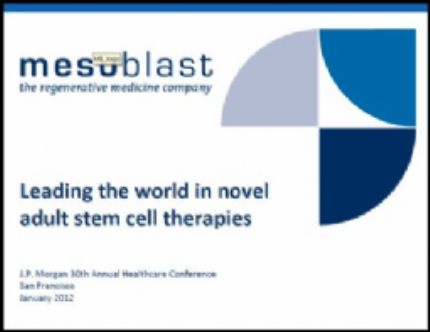
Mesoblast Limited (ASX:MSB) Cleared to Begin First Phase 2 Clinical Trial for Eye Diseases
Melbourne, Oct 24, 2011 AEST (ABN Newswire) - Regenerative medicine company Mesoblast Limited ( ASX:MSB) (
ASX:MSB) ( PINK:MBLTY) today announced that it has received regulatory clearance from the Singapore Health Sciences Authority (HSA) to commence the first Phase 2 trial of its proprietary allogeneic (off-the-shelf) adult stem cell therapy for patients with proliferation of leaky blood vessels in the eyes - neovascular ("wet") Age-related Macular Degeneration (AMD). Wet AMD causes sudden and severe central vision loss and accounts for approximately 90 percent of all blindness in the elderly. Mesoblast is developing a stem cell therapeutic product for treating various vascular diseases of the eye, including wet AMD and diabetic macular edema (DME).
PINK:MBLTY) today announced that it has received regulatory clearance from the Singapore Health Sciences Authority (HSA) to commence the first Phase 2 trial of its proprietary allogeneic (off-the-shelf) adult stem cell therapy for patients with proliferation of leaky blood vessels in the eyes - neovascular ("wet") Age-related Macular Degeneration (AMD). Wet AMD causes sudden and severe central vision loss and accounts for approximately 90 percent of all blindness in the elderly. Mesoblast is developing a stem cell therapeutic product for treating various vascular diseases of the eye, including wet AMD and diabetic macular edema (DME).
In North America, the prevalence of wet AMD is estimated to grow to nearly 3 million by 2020, from 1.7 million today, with about 200,000 new cases diagnosed each year. The current standard-of-care for wet AMD in North America is repeated intraocular injections using an anti-vascular endothelial growth factor (anti-VEGF) agent, such as Lucentis and Avastin. However, treatment needs to be maintained long-term since cessation of repeated injections results in rapid disease recurrence and risk of vision loss.
In Asia, wet AMD affects as many as 1.9% of people 65 or older. However, up to 55% of cases of wet AMD in Chinese, Japanese, and Malay populations are caused by Polypoid Choroidal Vasculopathy (PCV), a disorder of eye blood vessel proliferation that is different from the wet form seen in North America and Europe. Anti-VEGF therapy does not result in adequate regression of PCV lesions, and for this reason first line therapy for PCV is photodynamic therapy.
Mesoblast's proprietary adult stem cells may be effective for both forms of wet AMD since they have successfully reduced excessive blood vessel formation and leakiness in several preclinical studies:
1. Results from a study at the Lions' Eye Institute in Western Australia in 30 rodents with laser-induced excessive blood vessel formation showed that a single intra-ocular injection of human MPC prevented development of leaky blood vessels beyond day 7 after laser-induced damage (eyes treated with MPC had 39% and 32% non-leaky vessels at days 14 and 28, compared with only 7% and 2% non-leaky vessels in the controls at the same time-points, p<0.05). Moreover, at day 28 only 9% of vessels in eyes treated with a single MPC injection were severely leaking compared with 28% of vessels in control eyes (p<0.05).
2. Results from a trial at Charles River in Canada in 42 non-human primates with laser-induced excessive blood vessel formation showed that combining a single injection of Mesoblast's allogeneic cells with an injection of the anti-VEGF agent Lucentis resulted in a synergistic, and superior, outcome compared with Lucentis alone in reducing severity of blood vessel leakage within 2 weeks (p<0.05), preventing relapse of severe vessel leakage by days 28-42 (p<0.05), reducing total formation of new blood vessels (p<0.01), and preventing retinal detachment by day 42 (p<0.01).
Mesoblast's randomized, placebo-controlled Phase 2 trial will recruit 18 patients at the Singapore National Eye Centre. The trial will evaluate the safety and effectiveness of a single intraocular injection of Mesoblast's allogeneic Mesenchymal Precursor Cells (MPCs) combined with the anti-VEGF agent Lucentis in newly-diagnosed wet AMD patients. Controls will receive Lucentis alone. The trial will seek to establish if the allogeneic MPC treatment reduces the need for repeated monthly injections of Lucentis whilst improving visual acuity and quality of life.
Mesoblast Chief Executive, Professor Silviu Itescu, said: "Our preclinical results to date suggest that a single injection of Mesoblast's allogeneic cells may be effective for patients with wet AMD, either in combination with an anti-VEGF agent for the form seen in North America/Europe or in combination with photodynamic therapy for the PCV form seen in Asia.
"Initiating this Phase 2 trial in Singapore will help lay the foundation for us to launch larger trials in parallel for wet AMD in both Asian and non-Asian populations.
"This signals a clinical strategy by Mesoblast to increasingly target the emerging and very accessible large Asian healthcare markets. This is in line with our broader corporate strategy, including our recent manufacturing agreement with Lonza which provides Mesoblast with exclusive access to Lonza's cell therapy facilities in Singapore for the manufacture of allogeneic products," Professor Itescu added.
Contact
Julie Meldrum
Corporate Communications Director
T: +61-3-9639-6036
C: +61-419-228-128
Email:julie.meldrum@mesoblast.com
| ||
|







